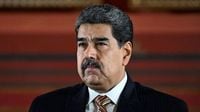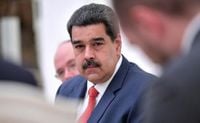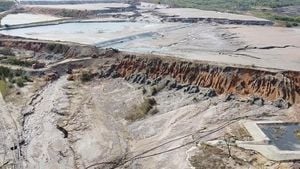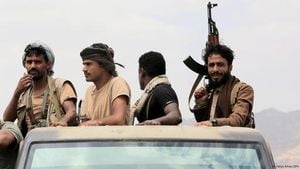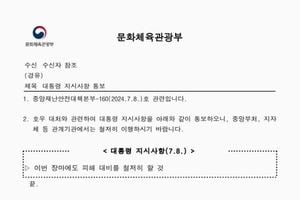In a dramatic escalation of tensions across the Caribbean and Latin America, the United States has sharply increased its military presence in the region, drawing fierce condemnation from Venezuela and raising concerns among neighboring countries. The latest deployments, which began in late August and intensified into September 2025, are part of President Donald Trump’s sweeping campaign to combat Latin American drug cartels—a campaign that critics say is also a pretext for exerting political pressure and effecting regime change.
According to multiple U.S. officials who spoke to Reuters and the Miami Herald, the Pentagon has dispatched a formidable array of naval assets to the southern Caribbean. The guided-missile cruiser USS Lake Erie and the nuclear-powered fast attack submarine USS Newport News were scheduled to arrive in Caribbean waters by early September. They join a task force that already includes three amphibious ships—San Antonio, Iwo Jima, and Fort Lauderdale—stationed off Venezuela’s northern coast. Together, these vessels carry about 4,500 personnel, including a Marine expeditionary unit of roughly 2,200 troops trained for rapid crisis response.
Three Arleigh Burke-class guided-missile destroyers—the Sampson, Jason Dunham, and Gravely—are also operating in the region. These warships are equipped with vertical launch systems capable of firing Tomahawk cruise missiles, standard missiles for air defense, and rocket-assisted torpedoes for anti-submarine warfare, giving the U.S. Navy a potent mix of offensive and defensive capabilities. The Pentagon has not publicly detailed the mission objectives, but senior administration officials have indicated the deployments are meant to “counter threats to U.S. national security posed by groups that the Trump administration has formally designated as ‘narco-terrorist organizations.’”
White House press secretary Karoline Leavitt underscored the administration’s commitment, telling reporters, “President Trump has been very clear and consistent: he’s prepared to use every element of American power to stop drugs from flooding into our country and to bring those responsible to justice.”
But the scale and nature of the U.S. military buildup have alarmed Venezuela, whose president, Nicolás Maduro, has accused Washington of threatening his country’s sovereignty. On September 1, 2025, Maduro declared, “Venezuela is confronting the biggest threat that has been seen on our continent in the last 100 years. A situation like this has never been seen,” as reported by TEMPO.CO. He described the deployment of U.S. ships—allegedly pointing “1,200 missiles” at Venezuela—as “an extravagant, unjustifiable, immoral and absolutely criminal and bloody threat.”
In response, Maduro vowed maximum preparedness, promising to “constitutionally declare a republic in arms” if Venezuela were attacked. He said the country had entered “maximum military preparedness for the defense of Venezuela,” and announced a sweeping militia mobilization. “This week I’m launching a special plan to ensure coverage by more than 4.5 million prepared, activated, and armed militia members across the national territory,” Maduro said during a televised event, flanked by senior military commanders. He denounced what he called “extravagant, bizarre, and outlandish threats” from Washington and insisted Venezuela would resist any foreign incursion.
The Trump administration, for its part, has accused Maduro of leading a drug cartel known as the “Cartel de Los Soles,” and in a move that has further inflamed tensions, has doubled the bounty for Maduro’s capture to $50 million—an unprecedented figure for a sitting head of state. U.S. prosecutors have indicted Maduro and several top aides, alleging they turned Venezuela into a narco-state and conspired to flood the United States with cocaine. The administration has also designated Mexico’s Sinaloa Cartel, Venezuela’s Tren de Aragua gang, and several other groups as global terrorist organizations, giving U.S. agencies expanded authority to freeze assets and pursue cartel leadership with counterterrorism tools.
Yet, as Fresno Alliance points out, the evidence for Maduro’s direct involvement in drug trafficking remains highly contested. Critics argue that the Trump administration’s accusations are politically motivated, aimed at justifying regime change. “This cartel does not appear to exist anywhere except in the wet dreams and political rhetoric of Trump, Secretary of State Marco Rubio and company; certainly no independent evidence exists for any involvement at all of the Venezuelan government in drug trafficking,” the publication reported.
The U.S. campaign has not been limited to Venezuela. In August 2025, President Trump secretly issued a directive authorizing the use of military force in other countries to target Latin American drug cartels, according to Fresno Alliance. The directive gives the Pentagon authority to invade or attack vessels at sea—an action that, critics note, would be illegal under U.S. law without congressional approval. The administration’s aggressive posture extends to Mexico, Brazil, and Cuba, with tariffs, sanctions, and threats of military intervention forming the backbone of a broader strategy to force compliance with Washington’s interests.
Mexico’s President Claudia Sheinbaum has firmly rejected any possibility of U.S. troop invasion, stating, “The U.S. will not bring troops into Mexico; there will be no invasion; this is absolutely rejected. We’ll see what is in the executive order, but there is no risk that they will invade our territory. Whenever they have suggested this, we have always said no, that we can collaborate in other ways but that, in this way, no. Therefore, no.”
Elsewhere, the U.S. has imposed sanctions on Brazilian Ministry of Health officials involved in the “More Doctors” program and has threatened officials in Cuba and other countries participating in Cuban medical missions. Panama and the Bahamas have reportedly capitulated to U.S. pressure regarding Cuban medical missions and immigration cooperation, underscoring the reach of Washington’s coercive policies.
Meanwhile, Venezuela’s neighbor Guyana has welcomed the U.S. military deployment. Tensions between the two countries have been running high since ExxonMobil discovered massive oil deposits off the coast of the disputed Essequibo region. Guyana’s President Irfaan Ali stated his country “will support anything to eliminate any threat to our security,” after accusing Venezuela of firing shots at a boat carrying election materials in the oil-rich region—a claim Venezuela’s Defense Minister Vladimir Padrino Lopez dismissed, accusing Guyana of “trying to create a war front.”
As the U.S. continues to ramp up its military and economic pressure, the region finds itself at a crossroads. Supporters of the Trump administration view the crackdown as a necessary response to the real threat posed by powerful drug cartels and transnational crime. Critics, however, see a dangerous pattern of interventionism and a disregard for national sovereignty, with echoes of past U.S. actions in Latin America.
For now, the Caribbean remains on edge, bracing for what comes next as the rhetoric and deployments show no sign of abating. The stakes—regional stability, national sovereignty, and the fate of millions—could hardly be higher.
